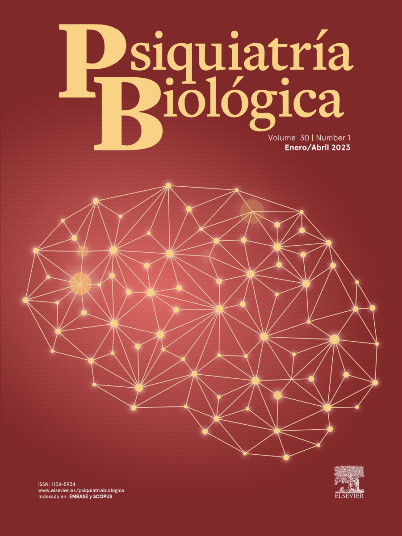Se pretende analizar las características clínicas de menores con superdotación intelectual y autismo, planteando que la identificación temprana de superdotación no se acompaña de un diagnóstico temprano de TEA.
Material y métodosAnálisis descriptivo de una muestra de pacientes (n=8) de 7 a 16 años, con Altas Capacidades identificadas, derivados a una consulta específica de autismo infantil para evaluación diagnóstica.
Resultados6 de los pacientes recibieron diagnóstico clínico de TEA. Solo 3 de los pacientes superaron el punto de corte de espectro autista en la evaluación ADOS-2. La edad media de detección de Altas Capacidades fue de 5,88 años, y la de TEA fue de 9,83 años, transcurriendo un tiempo medio de 4,83 años. Todos habían sido evaluados en Servicios de Salud Mental, y 7 habían recibido, al menos, un diagnóstico psiquiátrico previo, así como tratamiento psicofarmacológico.
DiscusiónPosiblemente, la superposición de características clínicas de las Altas Capacidades con los síntomas TEA retrase el diagnóstico del segundo cuando se han detectado las primeras, tanto por un fenómeno de enmascaramiento, como por un sesgo de atribución, debido a que la categoría de Altas Capacidades sea mejor aceptada. El deterioro clínicamente significativo de estos pacientes parece agravarse en la adolescencia. La conceptualización incompleta de la neurodivergencia podría estar dificultando a los profesionales clínicos la identificación y clasificación de menores con neurodesarrollos atípicos.
ConclusionesLa identificación de una superdotación podría retrasar el diagnóstico de TEA. Se debe ampliar la investigación sobre neurodesarrollo y neurodiversidad, la inteligencia y su relación con el TEA. Es imprescindible la formación específica en neurodesarrollo de psiquiatras infanto-juveniles.
We intend to analyze the clinical characteristics of intellectually gifted minors with autism spectrum disorder (ASD), stating that early identification of giftedness is not linked to an early ASD diagnosis.
Material and methodDescriptive analysis in a sample of n=8 patients ages 7 to 16, with identified giftedness refered to a medical consultation specialized in infantile autism for a diagnostic evaluation.
Results6 of the latter referred patients received an ASD clinical diagnosis. Only 3 of the patients were above the cut-off point for autism spectrum on the ADOS-2 evaluation. The average age of detection was 5’88 for Giftedness and 9’83 for ASD, with an average time of 4’83 years elapsed in between. All of them had been previously evaluated in Mental Health Services and 7 had received at least one previous psychiatric diagnosis, as well as psycho-pharmacological treatment.
DiscussionIt is possible that the superimposition between the clinical characteristics of Giftedness and ASD symptoms may delay the latter’s diagnosis when the previous have been detected, be it due to a masking phenomenon, an attribution bias, or that the Giftedness category is better accepted. This patients significant clinical deterioration seems to worsen during adolescence. The uncompleted conceptualization of neuro-divergence may be hampering the clinicians ability to identify and classify minors with an atypical neurodevelopment.
ConclusionsGiftedness identification may delay ASD diagnosis. We must improve investigation about neuro-development and neuro-diversity, as well as intelligence and its connection to ASD. Child and Adolescent psychiatrists’ specific training in neuro-development is therefore essential.






